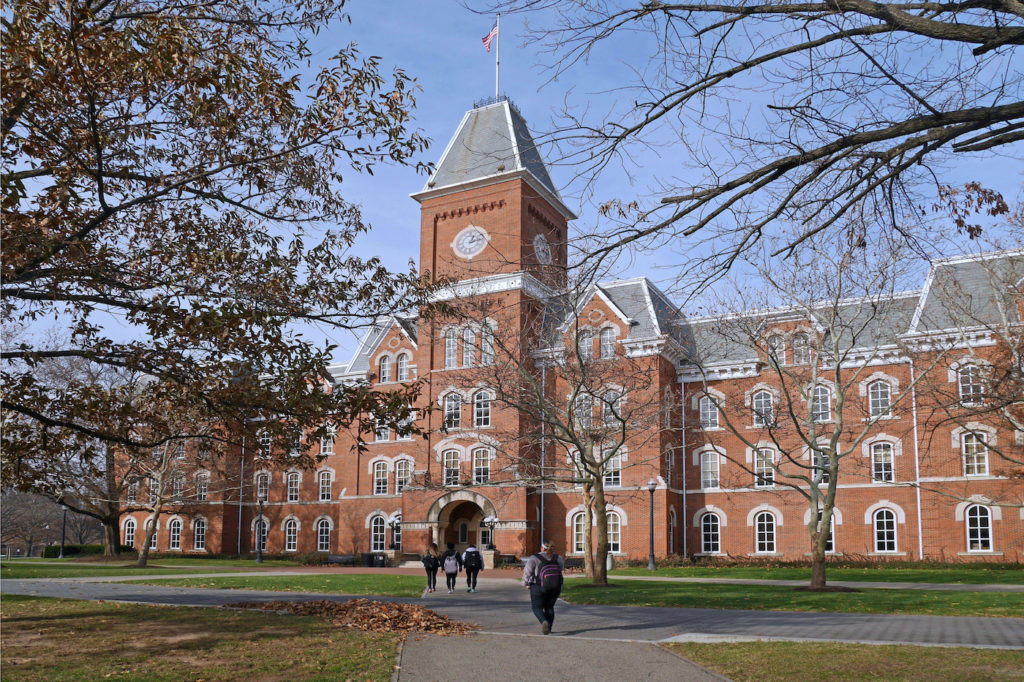Should universities form their students to be moral human beings? This question has been the subject of increasingly intense debate, including at Public Discourse, as academic life becomes an all-or-nothing contest between opposing visions of the good.
Many contemporary progressives seem to believe that universities should be concerned with the moral formation of students. As conservative commentator Yuval Levin notes, they foster an “assertively moralistic” campus culture to advance egalitarianism and justice for the oppressed. At times they even display religious fervor, calling for “a kind of mass repentance for . . . grave collective sins” through quasi-liturgical protests “of performative outrage.”
While Levin agrees with supporters of academic freedom that the purpose of a university is the discovery and application of knowledge rather than “to make our society more just,” he also thinks the university should be “a mold of moral character.” Similarly, Public Discourse author Nathanael Blake argues that it is imperative for academic communities to cultivate shared moral standards and norms, and that academic freedom should not be treated as an absolute good.
On the other hand, conservatives like Robert Miller caution that, although there are moral risks to free speech on campuses, “a system of censorship” facilitates “abuses of power” that are perhaps worse. He insists that academic communities should be able to flourish even if some of their members speak or write in support of “morally reprehensible ideas.”
Start your day with Public Discourse
Sign up and get our daily essays sent straight to your inbox.To think through the place of intellectual freedom and moral formation in college, we should begin with John Henry Newman’s classic discussion of these questions in The Idea of a University. Although Newman thinks the university should not be indifferent to morality, he suggests we ought not to look to it to teach character, because the natural purpose of university education is to form the intellect, not morals.
Perfecting Intellects, Not Forming Morals
An influential Catholic convert with a deep commitment to his faith, Newman was a foe of “liberalism in religion,” which is the idea that all religions are as good as each other and that we should not seek truth in religious doctrines. His rejection of this relativism underlies his perspective on education. He believes that the “direct end” of the university is not moral formation—“to make men better”—but “the perfection . . . of the intellect” through “Liberal or Philosophical Knowledge.” Here, Newman does not mean “liberal” in a narrow political sense or “philosophical” in an obscure technical sense. Rather, he has in mind a comprehensive view of truth in all of its different branches and forms, across the sciences, humanities, and arts.
For Newman, it is important for students to learn not just the truth of each field, but the way in which things connect and bear upon each other. For this reason, he believes that a university should be large, admitting students from different places with a diverse range of perspectives, so that they can learn from each other, see things in their totality, and enlarge their minds. This vision is more consistent with those contemporary voices who call for academic freedom and open inquiry, rather than those such as Blake (and his woke counterparts) who emphasize shared morality.
In Newman’s account, the principal purpose of the university is to cultivate the intellect to be able to grasp things in the connected manner described above, and ultimately to be able to disseminate this knowledge. In this view, if one wants to enter a profession—whether law, medicine, or plumbing—one does not go to a university but to a trade school. Equally, if one wants to be moral or religious, one does not join a college, but a charitable society or a religious congregation.
For Newman, the principal purpose of university is to cultivate the intellect to be able to grasp the way in which things connect and bear upon each other, and ultimately to disseminate this knowledge.
The function of scholars and academics also explains why moral instruction should only be seen as an incidental part of university education. As the German sociologist Max Weber noted, professors as such are not competent to form students’ morals because “the qualities that make someone an outstanding scholar and academic teacher are not those that create leaders in practical life.” Universities may offer professional and moral education, but then they act in name only as universities, just as, to use Aristotle’s example, when a doctor builds a house, he is, in that act, a housebuilder and not a doctor.
Of course, universities throughout their history have claimed competence in professional and moral training, and with good reason: with a well-trained mind one will do just about anything better, technically or morally. A university education allows one to “see things as they are,” Newman says—to be able to grasp the gist of any subject, quickly and accurately, to understand how different things might connect with or relate to each other, and therefore to develop the ability to succeed in any number of professions. In modern terms, we might say it makes one a good “problem solver.”
To a certain degree, then, university education can inform the moral life of students by impressing upon them the complexity of the human condition and helping them to develop what Newman refers to as “candid, equitable, dispassionate” minds. He explains that university students learn how to see things from other people’s point of view and therefore “how to influence them, how to come to an understanding with them, how to bear with them.” As he famously said, speaking of the all-male student bodies of his time, the university makes one a “gentleman.”
However, this limited and indirect type of moral formation does not mean that the university will be truly effective or reliable in forming a moral conscience. As Newman observes, to be a gentleman is “no guarantee” of “conscientiousness.” To be moral is to choose well, and choice is the act of the will—the heart, as some call it—not just the intellect. Choice is always informed by intellectual judgment, but the will is free to follow one judgment and not another. While a well-formed intellect can produce good taste and decency and therefore protect against “excesses and enormities of evil,” Newman reminds us that refined intelligence alone provides “no high principle” and no “protection in the case of violent temptation.”
This means that Harvard can graduate both Theodore Roosevelt, an eminent statesman, and Unabomber Ted Kaczynski, a brutal murderer, because intellectual formation is compatible not only with real virtue but also with hedonism and cruelty.
Sinful Humans, Sinful Humanities
The task of moral formation would “burden” the university by interfering with its real mission: training the intellect to grasp truth. To do that the university must give students’ minds exercise by exposing them to as much of reality as possible, whether in the sciences or the humanities. But the humanities, the words of human beings, will always include immorality, because every human being is sinful. As Newman puts it, we cannot have “a sinless Literature of sinful man.”
Some colleges might seek to design a curriculum comprising only Christian texts, while others—particularly in today’s academic landscape—might wish to offer an entirely politically correct curriculum. The former might persuade people to be Christian, just as the latest woke books might persuade people to side with the oppressed. But either syllabus alone would give an incomplete picture of humanity, as absurd as the curriculum Plato proposed in the Republic, in which heroes never displayed sorrow at the thought of death, the wicked seldom seemed to experience happiness, and vice and excess were almost nonexistent.
Each syllabus would also be so mediocre as to embarrass the moral system that it claimed to represent. Many strictly “Christian” curricula, Newman points out, actually show “God’s grace and its work at [a] disadvantage”: lives of the saints just don’t compare as literature to George Eliot’s Middlemarch. Similarly, a woke curriculum that excluded To Kill a Mockingbird for putting offensive racial epithets in characters’ mouths would deprive students of the chance to study not only one of the great American novels, but also a powerful critique of racism.
The university must give students’ minds exercise by exposing them to as much of reality as possible. But the humanities will always include immorality, because every human being is sinful.
Moreover, exposing students to evil in the abstract written word has the indirect moral benefit of immunizing them against real evil. Curricula that eliminate all immorality increase students’ chances of falling into the sins those curricula aim to prevent. As Newman warns, if you cut out vice from your textbooks, it will be “waiting for your pupil’s benefit at the very doors of your lecture room in living and breathing substance.” Without suitable instruction, students will be seduced by its novelty and unprepared to navigate its temptations and threats.
Newman does acknowledge that intellectual formation can indirectly harm morality. One might keep certain texts out of a classroom if they have no intellectual substance and offer only moral seduction, like pornography. Some of the great books might also be unsuitable for young people going through the emotional challenges of adolescence. But works of genius that don’t belong in high school probably do belong in a college classroom. Each college must decide which books to tolerate—but they should keep in mind that, although too much tolerance may increase moral risks for undergraduates, too little undermines the university’s ability to advance Newman’s vision of preparing students for the world.
Looking beyond the University
Professors can take part in moral formation; indeed it is their duty as human beings. But as Weber cautions, a professor should do so “in his personal relationships with students, individually,” and not in the lecture hall under the mantle of his scholarship. Treating intellectual achievement as a moral credential is a sleight of hand that, in the long run, does more harm than good to minds and morals.
Everyone needs to learn to choose well, but for that we look not to the university and the intellectual life, but to the family and ultimately God and religion—or for Newman, “the Church, . . . the representative of the religious principle.” God alone can satisfy our hunger and thirst for justice, because he alone, with our cooperation, can recreate our hearts burdened with sin. Students and scholars who seek such fulfilment from the intellectual life are looking in the wrong place.
But one could hardly blame them for their confusion. As Levin suggests, many students embrace the moral systems campus activism offers because “society at large offers them no other such framework that they can respect.” In addition, they increasingly come from homes broken by the moral anarchy of the sexual revolution, where they get little moral formation, if any at all. Many parents still provide good examples to their children, but naively delegate to schools the task of educating their children’s character, a responsibility that should always fall to them. Even at their best, teachers do not enjoy parents’ moral authority and influence over children, and at their worst they indoctrinate children with ideologies that would horrify parents.
If parents, families, or other local communities fear college is corrupting their youth, they should first sincerely examine whether they are fulfilling their responsibility to raise their children well before they leave home. They might also ask whether they could do more to support the chaplaincies and similar clubs at their children’s colleges whose moral purpose—which is fittingly called extracurricular, beyond the mission of the school—can complement the intellectual formation of the classroom. Nevertheless, by the time they reach college, students’ moral dispositions are established enough that, even if others—teachers or chaplains—tried to sway their choices, the task would be difficult.
In the end, the student decides for himself which moral admonitions to follow. We can be swayed by the authority and example of others, especially that of our parents, but all of us, even young children, must still cooperate with the education we receive if it is to change us. And we can be certain that even the best students with the best upbringing will still make bad decisions, because as Newman reminds us, humanity is “sure to sin.”
Ultimately, university education—like politics—is only indirectly related to the moral life. We should seek moral formation, but if we expect universities to form our character, we will be disappointed, just as much as if we expect human governments to make heaven on earth.
Let universities hold students and professors to the standards proper to higher education: the postulates that universal truth does exist, that we can know it, and that it cannot contradict itself. Then let all of us accept responsibility for pursuing virtue by our choices, looking to God—not human beings—as our standard. Institutions can help us in the task of moral living, but they cannot do it for us.














